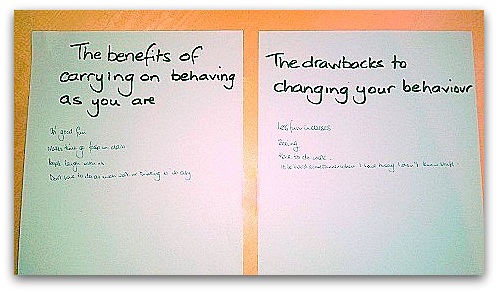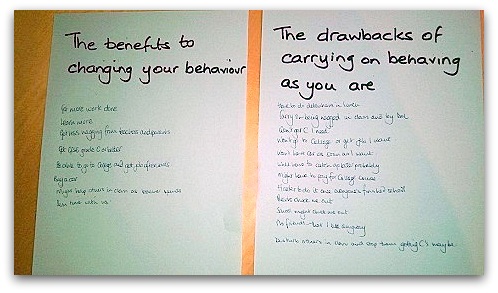Destination nowhere without a change
Returning guest poster, Teacher Coach Amanda Clegg shares more real life coaching experience in today’s guest post.
Destination nowhere without a change
by Amanda Clegg

“If you do not change direction, you may end up where you are heading.”
(Lao Tzu)
As a teacher of some thirty years, I have often seen students with talent and ability throw it all away. The reasons are different, but the waste of opportunity is always the same. Recently I met an ex student in a deserted street, I had sadly permanently excluded him when I was Principal. These situations are never pleasant and I wondered how he would react all these years later.
Luke* noticed me almost as soon as I noticed him. He crossed the street and came right up to me blocking my passage on the pavement. He put out his hand and greeted me in a jovial fashion. I shook it and smiled back as my heart rate and adrenaline levels slowly decreased. He told me he was doing well now and that he had a girlfriend, a job and a flat of his own. He went on to say he was pleased I had taken a hard stance with him, because it was what he needed to make him recognise where he was headed. I cannot tell you the joy that I felt in my heart when we had finished talking. The heartache at the time was all worthwhile. Luke* was only one of two students I had to make the decision to admit we had failed. I now realise that with Luke* we had not failed, but made the right decision to help him on his first step to success.
Recently more so than ever before, I have noticed an increasing lack of willingness by students to even try to answer a question or start a task. For some reason they seem scared of getting it wrong. They do not want to see scored out work or teacher crosses on their pristine work. I am doing my best to get students to have a go and explain I really do not mind if they get it wrong. I deliberately do not rub out my work on the board anymore if I get something wrong. I put a line through it. I actively go overboard at thanking students who have a go at a question but don’t quite get it correct. Later in the lesson or the following one, I will quietly check with this student that they now know the answer. Then you guessed it – I ask them in front of everyone and they give the right answer so being rewarded with a merit (or chocolate or sticker). They have learned from making a mistake.
I told a class about Thomas Edison and how he is reported to have exclaimed “I have not failed, I have just found 10,000 ways that did not work” when experimenting with the light bulb. A lad said “That is inspirational Miss”. I thought he was being flippant, but afterwards he told me he really did find it a good way to look at things.
James and David* did not see how their continued low level disruptive behaviour was affecting their teacher. This is where I came in to try and assist as I was coaching this particular teacher. They did not see that it affected the work they completed or that they did not understand much of the content being taught. James and David* failed to recognise that some of their class mates were getting frustrated by their antics. The more the teacher tried to discipline them, the sillier they became. The class teacher was using all the tools available to her and when she finally had to send them out I took the opportunity to work with them.
We went into the Science work room. I placed four sheets of sugar paper around the room on the walls.
You may not be able to discern exactly what is written on each sheet, however just by looking at the number of comments it is possible to unpick their thinking.


It was so interesting to see James and David* work together on this task and the sudden realisation that carrying on the way they were was not going to get them to their destination or preferred future.
This task was adapted from the work of Prochaska and DiClemente on the Cycle of Change. Both boys were certainly in the precontemplation phase during the lesson. They did not realise that their behaviour was having an effect on their future or that of others. It was just a bit of a laugh to pass the time of day.
When I set them a task with the four questions posed above, they were made to think about change and how it would benefit them or how it would be a drawback. The speed of realisation was quite fast and they were both very honest about how the process made them think about what they were doing.
A summary of the stages in the Cycle of Change
1. Precontemplation : I’m not even thinking about change/ I did not realise there was a problem
2. Contemplation: I may change or I may not – I am thinking about it
3. Decision: I have decided to change / I have decided not to change
4. Active Changes: I have started to change
5. Maintenance : I am keeping up with the change/ I have changed
6. Relapse : I have gone backwards
It is important as a coach to recognise and remind yourself that you cannot bring about change in another person. They must want to change themselves. It is their choice to decide whether to make a change or not.
After doing the task, I asked David and James* what they thought about the future and explained to them whatever they did was a choice. They were making a decision.
James said he felt that sounded “heavy” and he had never really thought about it before as being a choice. David said he felt ashamed he was affecting other people’s chances in the class as he was not too bothered about his future as his Dad would always have a job for him. He however was the student saying how hard it was to think and maybe he was doing it because he had lost the knack of thinking through a problem.
As always in a school, life is governed by the bell and the boys went off to their next lesson. The thing that struck me most about this session was that I did not have to do or say anything other than to ask them to be honest and answer the questions on the sugar paper. I have brought the horse to water- will it drink is the question?
I have had many such conversations with young people over the past thirty years and most where I did the “telling” rather than facilitating. I look back to the first part of the blog and wonder if I could have prevented myself and Luke from a lot of angst if I had let him do more of the talking.
*Names have been changed to protect their identity.
Further Reading:
Prochaska,J.O , Norcross, J.C and DiClemente, C.C. ( 2007) Changing for Good, William Morrow & Co.
About Amanda Clegg
 Amanda Clegg has been a science teacher in state secondary schools for almost thirty years. She was a member of a Senior Leadership team for 15 years before being asked to lead a private sixth form college through their initial ISI inspection. The college achieved an outstanding judgement. Amanda now works as an Educational and Coaching Consultant in Oxfordshire and Swindon. She is currently acting as temporary Head of Science two days a week in a local secondary school, as well as being an Associate trainer for Creative Education, co-author of a GCSE revision guide and an Associate Lecturer for UWE on the PGCE programme.
Amanda Clegg has been a science teacher in state secondary schools for almost thirty years. She was a member of a Senior Leadership team for 15 years before being asked to lead a private sixth form college through their initial ISI inspection. The college achieved an outstanding judgement. Amanda now works as an Educational and Coaching Consultant in Oxfordshire and Swindon. She is currently acting as temporary Head of Science two days a week in a local secondary school, as well as being an Associate trainer for Creative Education, co-author of a GCSE revision guide and an Associate Lecturer for UWE on the PGCE programme.
https://www.facebook.com/AKCConsultancy
http://uk.linkedin.com/in/akcconsultancy
email: cft-acleggsupanetcom
Twitter: @Teachercoach1